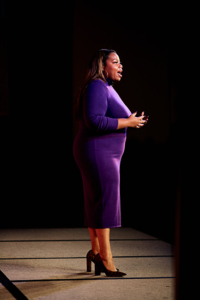Wellness
Taking center stage, women speak up for health equity
With reproductive rights under attack and professional and personal challenges escalated as a result of the pandemic, women have been collectively called…

Taking center stage, women speak up for health equity
By Maria Fontanazza | maria.fontanazza@medadnews.com
In early November, nearly 850 attendees from more than 100 companies came together for the sold out 2022 HBA Annual Conference in Philadelphia. With a theme appropriately titled, “New Era of Leadership”, conversations focused on empowering women throughout the healthcare ecosystem and being stronger advocates for health equity.
“This is the moment when our input matters as much as our output; a time for us to lean into innovation,” said Ashlee Haze, a spoken word performer who rallied participants at the opening of the conference. “Inclusion is not just talk – it’s something we back up with action. We don’t know what frontier is next, but we know it will require leadership unlike anything we’ve ever seen before; we know that the world will need our collective power – it will require us to truly work together and to pull on those voices we haven’t heard to guide us in the right direction.”
With reproductive rights under attack and professional and personal challenges escalated as a result of the pandemic, women have been collectively called on to lead with not just authenticity, but also with compassion, kindness, and empathy, said HBA interim CEO Wendy White. “In times of crisis, women take center stage. We are the peace makers, the solution seekers, the voice amplifiers.”
Over the past couple of years, many women have reevaluated priorities. “We’re in the midst of the Great Resignation, where women are demanding more from work and are leaving if they don’t get what they want,” said White, adding that companies are struggling to hold on to the relativity few women leaders they have in place. Yet at the same time, female professionals continue to face headwinds and microaggressions that make it harder to advance in the workplace.
Health equity requires gender-balanced leadership
“When you look at me, what do you see?” This is the question that Lauren Powell, Ph.D., vice president, US health equity & community wellness at Takeda Pharmaceuticals, asked the audience during her opening keynote. She went on to tell a powerful story about a medical emergency she suffered and the racism she was met with upon the arrival of the EMTs. The medical professionals who were supposed to provide immediate attention instead looked around her apartment and then asked her, “are you sure you can afford the ride in the ambulance to the hospital?”
Audible gasps from the audience.
Powell was suffering a life-threatening allergic reaction. Her throat was rapidly closing. “I could have died,” she said. “All of this because they looked at me and saw something, and they made an assumption about who I was.”
“When we talk about racism as an emergency, racism as a public health emergency, racism as a health emergency – racism almost killed me,” said Powell, who is also president & CEO of The Equitist, a consulting firm focused on helping healthcare organizations take action on health equity issues. “It’s because of experiences like this – they aren’t as isolated as we like to think – that I do the work that I do today.”
From her work within government entities to her current role in the pharmaceutical industry, Powell talked about her journey to realization that things were wrong in the healthcare system, how she brought health equity to the forefront of her career, and the crucial need for women from diverse backgrounds to stand up and lead in the healthcare space.
“Women’s rights are under siege,” said Powell, referring to The Supreme Court’s decision to overturn Roe vs. Wade. “Because we are a group of women working in healthcare, I think we should agree that abortion is part of healthcare. However you feel about it personally, our goal is to take care of people. Our goal is to save people. Abortion is actually a part of that.” She went on to acknowledge the progress that women have made but warned of the tremendous challenges ahead. “We can’t just sit back on our laurels. I regret to inform you that I do think there is a fight coming. The future will require more from us than we thought we had to give. As women leaders, we are required to step up to the plate. We are required to stand in rooms, to sit at tables, to speak on stages, and to tell the truth about how these decisions are going to impact us and impact the least of those among us.”
This brought Powell to the discussion about health equity, and the importance of making the distinction between equality and equity. Equality is giving everyone the same thing, regardless of a person’s level of need. Equity, however, is giving people exactly what they need, which means some people will get more than others, because their level of need is higher. Translation: “Equality is giving everyone shoes. Equity is giving people shoes that fit,” said Powell. She added that health equity is also a part of addressing racism and involves tackling all the systems of oppression – by finding the root causes. “We have to focus on ‘lived experiences’ – which is why we need leaders who have lived experiences,” she said.
Her challenge to attendees was to stand up for health equity, but in a way that ensures that those efforts don’t fall off their company’s next budget cycle, and to use respective platforms to speak the truth when it needs to be told. Of course, not everyone is in a leadership position, but that doesn’t mean that they cannot stand up and take action. “I recognize that we don’t all have the same level of power, privilege, and access. It’s important to be in rooms where you feel uncomfortable…where you don’t have the amen corner. It’s important to be in those spaces to enlighten. We all have the ability to do that,” said Powell. “My joy comes from having the opportunity to plant a seed — maybe all those things won’t click for someone for 10 years, but if I can offer a new way of thinking, that’s [a win] to me.”
|
Lauren Powell, Ph.D., vice president, US health equity & community wellness at Takeda Pharmaceuticals, and president & CEO of The Equitist, offered several takeaways for conference attendees. Rest. “Sometimes we think we have to earn rest. The reality is, you don’t earn rest, it is required.” Diversity is more than a euphemism. “Diversity is actually not enough without equity, inclusion, and justice.” Racism and health inequities cost all of us. “There’s this perception that health equity is only black and brown – and for urban communities. If we don’t have a healthcare system that works for all of us, it doesn’t work for any of us.” |
| Maria Fontanazza is the director of content, Med Ad News and PharmaLive.com. |

Lion’s Mane Mushroom: History, Benefits, and Adaptogen Properties
Explore the intriguing world of Lion’s Mane Mushroom in our comprehensive guide. Dive into its unique properties, historical significance, and myriad health…
AI can already diagnose depression better than a doctor and tell you which treatment is best
Artificial intelligence (AI) shows great promise in revolutionizing the diagnosis and treatment of depression, offering more accurate diagnoses and predicting…
Reasons You should Get this: Neptune Wellness Solutions Inc (NASDAQ:NEPT), WeTrade Group Inc. (NASDAQ:WETG)
NEPT has seen its SMA50 which is now -9.28%. In looking the SMA 200 we see that the stock has seen a -92.25%. WETG has seen its SMA50 which is …
The…















